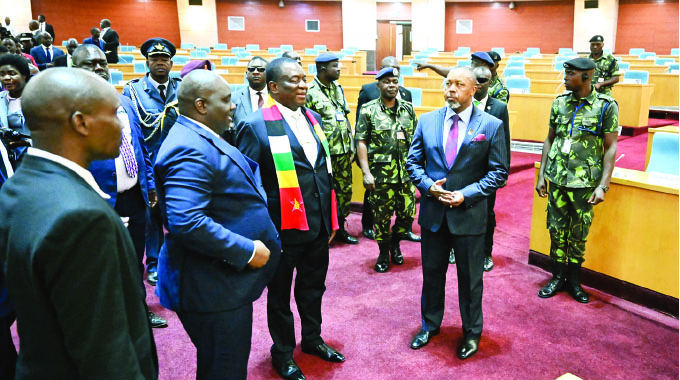Landmark Bill sails through Parliament

Zvamaida Murwira
Senior Reporter
The Criminal Law (Codification and Reform) Amendment Bill that seeks to punish those who campaign against the country through private correspondence with foreign Governments and harm national interest sailed through the National Assembly yesterday.
The Bill, that was passed with some amendments, now awaits transmission to Senate before heading for Presidential assent for it to become law.
There was heated debate during consideration of the Bill this week in the National Assembly leading to, at some point, the House being divided in order to vote for a clause that seeks to impose heavy penalties on those that call for sanctions against the country.
Justice, Legal and Parliamentary Affairs Minister Ziyambi Ziyambi brought amendments to the Bill which got overwhelming support from Zanu PF legislators while those from opposition CCC led by Harare East MP, Mr Tendai Biti opposed the amendments.
Debate ensued over the proposed amendments during Committee Stage of the Bill which analysed the Bill Clause by Clause until it was put to a vote where Zanu PF legislators carried the day.
At least 99 Members of Parliament voted in favour of the amendments while 17 voted against resulting in the adoption of the amendments.
Minister Ziyambi’s proposed amendments on Clause 2 (3) read as follows: “Any citizen or permanent resident of Zimbabwe who, within or outside Zimbabwe, intentionally partakes in any meeting, whose object or one of whose objects the accused knows, or has reasonable grounds for believing involves the consideration of or the planning for the implementation or enlargement of sanctions or a trade boycott against Zimbabwe (whether those sanctions or that boycott is untargeted or targets any individual or official, or class of individuals or officials), but whose effects
indiscriminately affect the people of Zimbabwe as a whole, or any substantial section thereof, shall be guilty of wilfully damaging the sovereignty and national interest of Zimbabwe and liable to . . . ”
The clause provides penalties that include a fine not exceeding level twelve or imprisonment for a period not exceeding 10 years, or both.
Other proposed penalties include termination of the citizenship of the convicted person, if that person is a citizen by registration or a dual citizen, prohibition of being a registered voter for a period ranging between five and 15 years and prohibition of standing for a public office for a prescribed period.
The Bill sailed through after the Parliamentary Legal Committee issued a Non Adverse Report on amendments that had been adopted.
Clause 5 of the Bill seeks to amends section 174(1) of the principal Act.
This was after it was felt that the current framing of the offence of criminal abuse of office as provided for in terms of the principal Act was very broad in its scope in that it gives room for public officers to be prosecuted for honest mistakes made during the course of their duties.
The proposed amendment will limit the crime to include an essential element of knowledge on the part of a public official that his or her conduct was illegal.
One of the objectives of the Bill is to enhance the provisions of the Criminal Law Code in matters relating to the country’s sovereignty through the criminalisation of conduct that undermined Zimbabwe’s sovereignty, dignity, independence and national interests.
The Bill also provides for a mandatory minimum sentence in rape and murder cases and expands the definition of “dangerous drugs”.
Meanwhile the National Assembly was by last night considering the Electoral Amendment Bill with debate focussing mainly on an array of amendments that had been proposed by CCC legislators.
Some of the amendments were rejected, while others were adopted with others being withdrawn after it was felt that they were already provided for in other legal instruments.
The Electoral Amendment Bill will operationalise the latest constitutional amendments for the election of 10 youth members of the National Assembly, one from each province, as well as the continued election of 60 women, six from each province, to the National Assembly under a party-list system.
It will extend the new constitutional provisions for the election of women on a party-list system to provincial councils and local authorities, and will prevent people from being nominated for election if they have been convicted of certain offences.
The Bill seeks to stop the use of driver’s licences as proof of identity by persons who register as voters and those who obtain ballot papers at polling stations.
Government has since indicated that President’s proclamation of August 23 2023 as the date on which harmonised elections will be held will not affect the Electoral Amendment Bill since most of what it contains was already provided for in the Constitution.







Comments